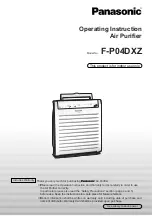
351579-YTS-B-0608
Johnson Controls Unitary Products
39
for economizer loading arises in Communicating Zoning
System applications (“VVT” systems) using supply air bypass
when heating load in the zones is low and a large amount of hot
supply air is bypassed back into return and mixed air
temperature is very high. Economizer loading may also be
needed when supply air flow across the heat exchanger is
lower than expected (e.g. wrong setting of fan speed, plugged
air filters). A secondary benefit of economizer loading is an
improvement in comfort as the supply air temperature is more
stable and cycling of the unit is minimized.
The economizer loading option in heating is not implemented in
VAV applications as these do not use supply air bypass and (in
case of using a zone thermostat) run all heating stages during
heating (economizer loading applies to only the 1
st
heating stage).
The economizer loading minimizes cycling of heating stage #1
and makes a trade-off between energy and the benefits
described above.
The Economizer Loading in heating option requires a SAT
sensor that can sense SAT in heating mode (a sensor placed
downstream of the heating stages). Such a sensor is provided
only as a field-installed accessory, on units equipped with
heating stages. The SAT sensor that is factory-installed can be
used for cooling mode only. If a field-installed sensor is added, it
will replace the factory-installed one and will then be usable for
both heating and cooling modes.
The loading is done by the similar control algorithm as used in
the normal economizer operation. The algorithm is activated to
do this function in following conditions:
• Heating mode
• The programmable option “Economizer Loading to Control
SAT” is ON
• Only heating stage #1 is running
The PI control algorithm in this case has a capability to
automatically change from direct to reverse acting in response
to difference between OAT and RAT. When OAT is less than
RAT the algorithm is direct acting, when OAT is greater than
RAT the algorithm is reverse acting.
This way, the “loading” of the heating stage is correctly done
with return, or outdoor air, as appropriate, and there is no need
to activate this “loading” function only in some specific range of
outdoor air temperatures (e.g. OAT > programmed first heating
stage trip point minus 50 °F).
NOTE:
In this case, the provision for direct vs. reverse acting
switching is not essential feature of the control algorithm
and the algorithm could be implemented as direct acting
only in order to simplify implementation and save code
space. The situation when economizer loading in heating
is required while OAT greater than RAT is unlikely and if
it should occur, the difference between OAT and RAT is
negligible in comparison to the SAT control setpoint. The
Economizer Loading function in heating controls SAT to
a fixed temperature deadband of programmed “Econo-
mizer Loading Setpoint in Heating” and 5 °F below this
setpoint (the setpoint is programmable between 100 °F -
195 °F, default is 160 °F).
In units that use hydronic heat, the Economizer Loading function
may be enabled in order to be used for cooling (the on/off
programming choice for this function is common to both cooling
and heating). In this case, it is important to ensure that the
programmed value of the “Economizer Loading Setpoint in
Heating” is set higher than the value of “Hydronic Heat First Stage
Setpoint”. That, in normal conditions, assures that the Economizer
Loading function in heating is effectively disabled and the
economizer is closed to its minimum position during heating.
VAV
When is the Economizer operation used? If the rooftop unit is
equipped with an economizer and free cooling is available then
the Economizer Operation as specified in this section is used in
the following operation modes:
VAV cooling (except the programmed Economizer First Stage
Setpoint and Economizer Second Stage Setpoint are replaced
by the programmed VAV Upper Cooling SAT Setpoint and VAV
Lower Cooling SAT Setpoint)
DEMAND VENTILATION
Demand Ventilation Operation control mode is self-configuring
for the use of an Indoor Air Quality (IAQ) sensor - it will
automatically detect that an IAQ sensor is connected and use it
any time the IAQ sensor input indicates an IAQ level of 200
ppm, or higher.
NOTE:
Due to the self-configuration operation, an error due to
IAQ sensor failure can be indicated only in case the
IAQ sensor fails during normal controller operation. If
the IAQ sensor fails, or is removed / disconnected dur-
ing a power-off condition (e.g. during servicing of the
unit while the control is not powered), the control will,
on power up, self configure without the IAQ sensor
and no error indication is provided.
When the IAQ sensor is detected as available, the control will
use the Demand Ventilation Setpoint to control the IAQ levels in
the building by modulating the Economizer more open.
The Demand Ventilation will operate in units equipped with an
Economizer (Economizer option is turned ON) any time the
control is in Occupied mode. The Demand Ventilation Operation
is applicable in heating, or cooling mode, and will modulate the
Economizer damper more open, if necessary, from its
programmed minimum position (in heating, or in cooling when
economizer is not "suitable"), or from its modulated position
determined as defined in the Economizer Operation section (in
cooling, when economizer is "suitable").
An appropriate control algorithm is used to accomplish this
control. Preferably, this algorithm is a "step-and-wait" type, with
the step size calculated as a function of offset between the
Demand Ventilation Setpoint and the current IAQ level, and with
a fixed "wait", or sampling time. This algorithm is activated
whenever the IAQ level exceeds the setpoint and will override
the economizer position more open, as needed, up to a pre






































